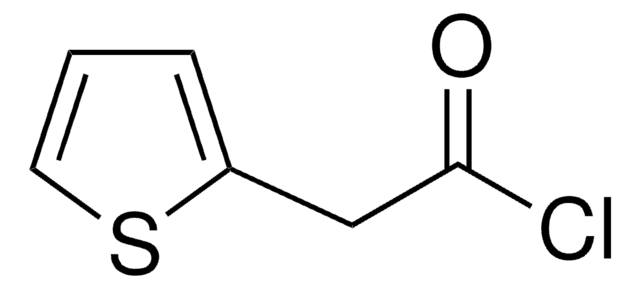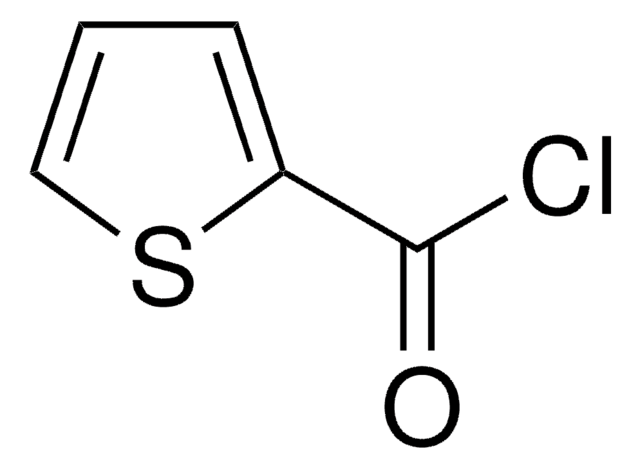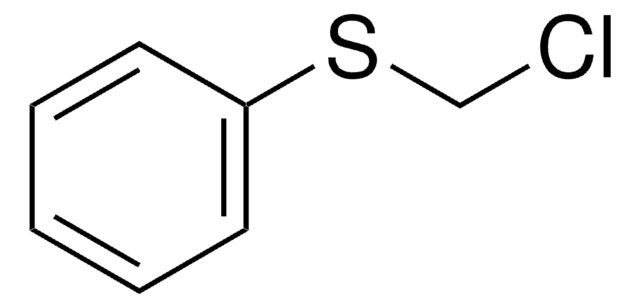All Photos(1)
About This Item
Linear Formula:
ClCH2CH2SC2H5
CAS Number:
Molecular Weight:
124.63
EC Number:
MDL number:
UNSPSC Code:
12352100
PubChem Substance ID:
NACRES:
NA.22
Recommended Products
Quality Level
Assay
97%
form
liquid
refractive index
n20/D 1.4885 (lit.)
bp
156-157 °C (lit.)
density
1.07 g/mL at 25 °C (lit.)
functional group
chloro
thioether
storage temp.
2-8°C
SMILES string
CCSCCCl
InChI
1S/C4H9ClS/c1-2-6-4-3-5/h2-4H2,1H3
InChI key
GBNVXYXIRHSYEG-UHFFFAOYSA-N
Related Categories
General description
2-Chloroethyl ethyl sulfide is a monofunctional analog of sulfur mustard (SM; 2,2′-dichloro diethyl sulfide). The mass diffusivity of 2-chloroethyl ethyl sulfide, a chemical warfare agent simulant, was studied.
Signal Word
Danger
Hazard Statements
Precautionary Statements
Hazard Classifications
Acute Tox. 3 Dermal - Acute Tox. 3 Inhalation - Acute Tox. 3 Oral - Carc. 1A - Eye Dam. 1 - Flam. Liq. 3 - Skin Corr. 1B
Storage Class Code
3 - Flammable liquids
WGK
WGK 3
Flash Point(F)
125.6 °F - closed cup
Flash Point(C)
52 °C - closed cup
Personal Protective Equipment
dust mask type N95 (US), Eyeshields, Gloves
Choose from one of the most recent versions:
Already Own This Product?
Find documentation for the products that you have recently purchased in the Document Library.
Customers Also Viewed
Anil K Jain et al.
Toxicology letters, 205(3), 293-301 (2011-07-05)
Bifunctional alkyalating agent, sulfur mustard (SM)-induced cutaneous injury is characterized by inflammation and delayed blistering. Our recent studies demonstrated that 2-chloroethyl ethyl sulfide (CEES), a monofunctional analog of SM that can be used in laboratory settings, induces oxidative stress. This
Matthew P Willis et al.
Journal of hazardous materials, 263 Pt 2, 479-485 (2013-11-15)
Chemical warfare agent simulants are often used as an agent surrogate to perform environmental testing, mitigating exposure hazards. This work specifically addresses the assessment of downwind agent vapor concentration resulting from an evaporating simulant droplet. A previously developed methodology was
Neera Tewari-Singh et al.
Chemical research in toxicology, 23(6), 1034-1044 (2010-05-18)
Effective medical treatment and preventive measures for chemical warfare agent sulfur mustard (HD)-caused incapacitating skin toxicity are lacking, because of limited knowledge of its mechanism of action. The proliferating basal epidermal cells are primary major sites of attack during HD-caused
Anil K Jain et al.
Toxicology, 282(3), 129-138 (2011-02-08)
Sulfur mustard (HD) is a vesicating agent that has been used as a chemical warfare agent in a number of conflicts, posing a major threat in both military conflict and chemical terrorism situations. Currently, we lack effective therapies to rescue
Adrienne T Black et al.
Toxicology and applied pharmacology, 249(2), 178-187 (2010-09-16)
Sulfur mustard is a potent vesicant that induces inflammation, edema and blistering following dermal exposure. To assess molecular mechanisms mediating these responses, we analyzed the effects of the model sulfur mustard vesicant, 2-chloroethyl ethyl sulfide, on EpiDerm-FT™, a commercially available
Our team of scientists has experience in all areas of research including Life Science, Material Science, Chemical Synthesis, Chromatography, Analytical and many others.
Contact Technical Service
















